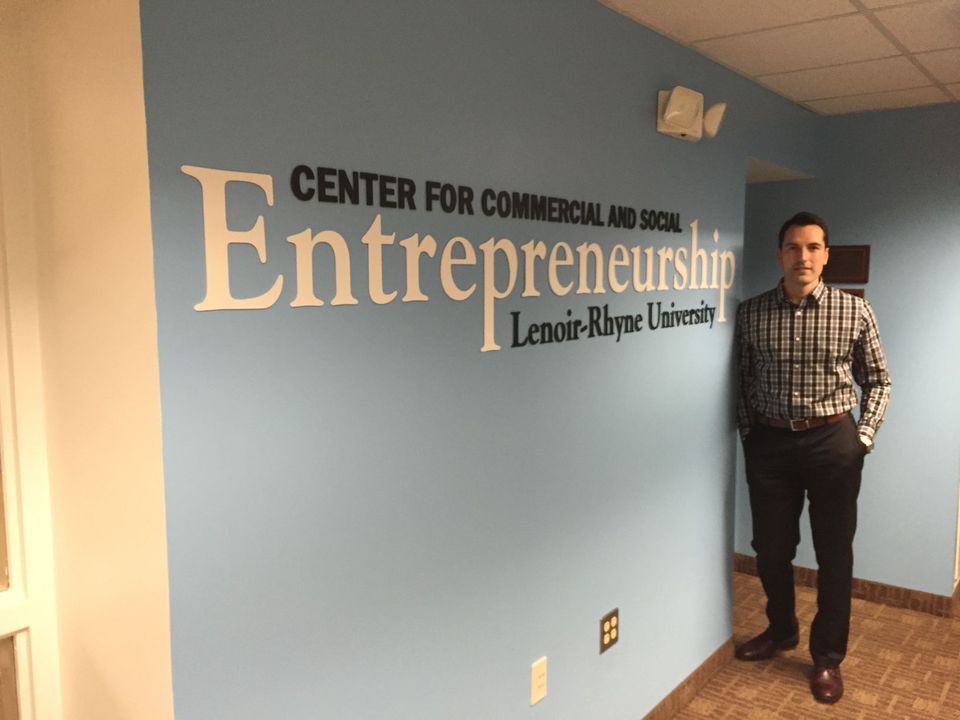Together Loans Student's idea to transform how Hickory does small business and the resource that made it happen
By JOSHUA FARMER jfarmer@hickoryrecord.com Hickory Daily Record
Posted: Friday, December 4, 2015 12:17 am

HICKORY – The idea started to come together during his sophomore year.
Charlie McBurney, now a senior social entrepreneurship student at Lenior-Rhyne University, was studying abroad in South Korea.
“And in one of my classes, we learned about Muhammad Yunus and microfinance,” McBurney said.
Yunus pioneered microcredit, offering small loans at affordable interest rates to the impoverished without requiring collateral. He won a Nobel Peace Prize for it in 2006 (along with Grameen Bank, which underwrote the loans).
The concept captivated McBurney.
He wanted to know if something similar could work in the U.S., but the lecturer said it wouldn’t be economically viable. McBurney tabled the idea and didn’t think much about it again until he got home to LRU, where a friend was studying the negative effects of predatory loan services on the poor.
They were both appalled, and one night while studying, the two hatched a plan.
“By the end of the night, we decided that we were going to start our own microfinance company,” McBurney said.
The idea was simple: create a bank that would offer small loans as an alternative to predatory services, which perpetuate a cycle of poverty with high interest rates and late fees.
“We had no idea how to go about it,” McBurney said. “But we were determined to make it work.”
Enter Ralph Griffith, business professor and director of LRU’s Center for Commercial and Social Entrepreneurship, or CCSE. He moved to Hickory from Michigan two years ago to run the center.
“After meeting with him, he immediately began taking our grandiose idea and helped us mold it into a practical, realistic and impactful organization,” McBurney said. “Over the next year, the idea came to fruition and Together Loans was created.”
Now, Together Loans is partnering with Community One Bank in Hickory, asking them to underwrite loans with the nonprofit as a cosigner, Griffith said.
The model for Together Loans is a service that provides micro loans to individuals who have their own entrepreneurial idea, but don’t have the resources to act on it alone, McBurney said.
“We have partnerships with banks and act as an intermediary between the bank and our client,” McBurney said. “We create an escrow account where we cosign the loan and match collateral 100 percent. This helps assure a lower interest rate and a longer repayment time.”
Essentially, Together Loans collateralizes the loans for their clients.
“It’s something that’s never been done,” Griffith said
And a critical part of the model is that borrowers build a credit score.
Most micro-lending businesses simply give money and expect that it be paid back, with no concern for borrowers who default, Griffith said. But, the credit score offers incentive to pay back their loan.
Griffith said borrowers are enrolled in personal finance courses and their businesses are invited into the CCSE incubator for additional guidance.
“Whether it is financial advice or moral support, our mission is to grow and provide as many loans as possible to change lives and make small business grow in our community,” McBurney said.
Together Loans recently reached its funding goal, becoming the center’s first nonprofit success story.
McBurney said the center helped by providing the initial space to begin to grow the idea.
“Once in that space, Dr. Griffith acted as our own personal business consultant and gave us deliverables that we had to meet,” he said.
Those deliverables were deadlines for progress. Because of the CCSE’s limited resources, the idea needed to grow quickly into something tangible.
Individuals from each of the center’s client businesses meet as a group weekly to update Griffith on their progress.
“If they don’t have the kind of passion we are looking for and they are not moving along projected milestones, then we ask them to leave the incubator,” Griffith said.
The center itself is a sort of self-sustaining community resource, with students constantly feeding in a pipeline of ideas they generate through the entrepreneurship curriculum.
It offers everything from workshops and consulting for local companies to intern opportunities for students, and it does this without taking any equity in the businesses it helps.
It has the capability to include up to seven in its invite-only incubator at a time, and there’s a waitlist to get in.
“At Lenoir-Rhyne, we see it as helping our community,” Griffith said. “We’re putting a huge investment into these students and our hope is that they stay in the community.”
The only thing LRU asks of those in its incubator is for a commitment: stay within Catawba County, primarily Hickory, for five years.
Research suggests that, after the three-year mark, a business will likely stay within the community, hiring local talent and pumping dollars into the economy.
No one has really hit it big just yet, at least as far as maintaining a solid presence in the marketplace, Griffith said. But, they’re getting close and the creation of the nonprofit is a big step forward for the CCSE.
“I think Lenoir-Rhyne has given it the resources and the potential and the capacity to do something very special,” Griffith said. “I think we’re doing it well.”
McBurney said he has high hopes for the future of his nonprofit, but he has measured his immediate expectations, looking to take it one step at a time.
“Ideally, in the future, I would love to see Together Loans, and its business model, sweep across the country and revolutionize how we as a nation approach microfinance,” McBurney said. “On more realistic level, I want Together Loans to make its first loan and then another loan and another. The future that I hope for Together Loans is that it continues to grow and empower people.”
Comments
There are no comments yet.
Leave a Comment